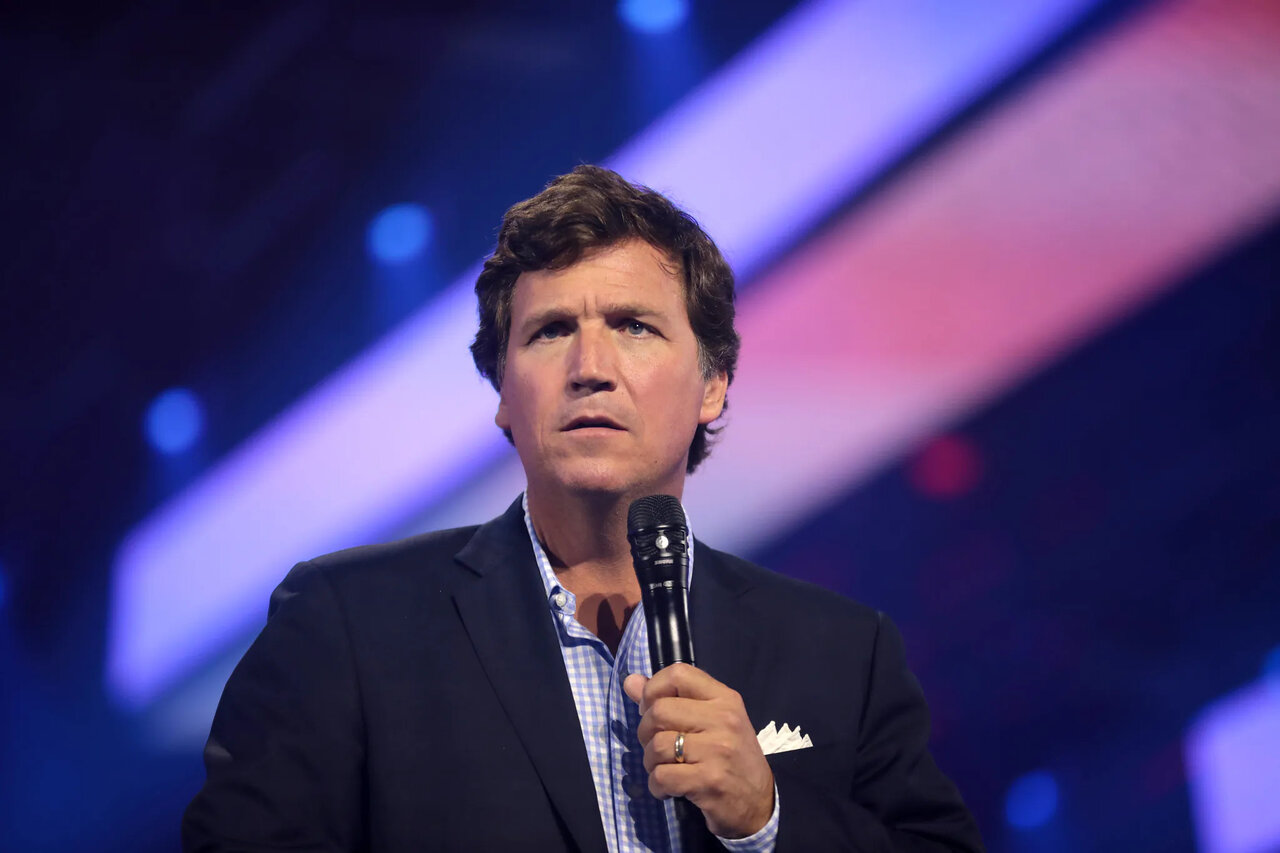Tucker Carlson warns: Neoconservative push for Iran war risks ‘world war, US defeat’

TEHRAN – Prominent conservative commentator Tucker Carlson has issued a stark warning against escalating tensions with Iran, describing a potential conflict as a catastrophic betrayal of President Donald Trump's core supporters and a reckless gamble with global stability.
In a widely-discussed X post on Thursday, Carlson, whose views are closely watched for their perceived influence on Trump and a significant segment of the conservative base in the U.S., articulated a forceful anti-interventionist position directly challenging influential neoconservative voices within the party.
The independent journalist asserted that support for a "regime change war in Iran" among Trump voters is virtually non-existent.
Carlson emphasized what he views as Trump's unique political positioning, stating, "Trump ran for president as a peace candidate. That’s what made him different from conventional Republicans. It’s why he won."
He argued that initiating such a conflict would constitute "a profound betrayal of his supporters" and predicted it would "end his presidency," suggesting this explains "why so many of Trump’s enemies are advocating for it."
Carlson's intervention comes at a crucial juncture, as Iran-U.S. indirect negotiations mediated by Oman remain underway.
The Trump administration’s demand for “zero-level” uranium enrichment threatens to derail diplomatic progress, while top Iranian officials firmly assert that uranium enrichment is the backbone of Iran’s nuclear industry and is non-negotiable.
’Thousands of dead Americans in the first week of war’
Furthermore, in his post, Carlson outlined the severe immediate risks of a potential conflict between Tehran and Washington.
Highlighting Iran's conventional military strength, Carlson noted the country possesses "a fearsome arsenal of ballistic missiles, many of which are aimed at U.S. military installations in the [Persian] Gulf, as well as at our allies and at critical energy infrastructure."
The commentator warned that "the first week of a war with Iran could easily kill thousands of Americans" and trigger economic collapse due to surging oil prices, starkly asking readers to "Consider the effects of $30 gasoline."
Carlson further cautioned that the conflict's scope could rapidly escalate beyond initial predictions. "Iran isn’t Iraq or Libya, or even North Korea," he wrote, pointing to Tehran's integration within the BRICS bloc, which he described as representing "the majority of the world’s landmass, population, economy and military power."
Citing Iran's "extensive military ties with Russia" and its key economic ties to China, Carlson concluded that "An attack on Iran could very easily become a world war. We’d lose."
He stressed these assessments align with Pentagon estimates and are not "far-fetched predictions."
Central to Carlson's critique was the role of pro-Israel figures like Mark Levin, a member of the Trump Administration's Homeland Security Advisory Council and a Fox News host.
Carlson portrayed Levin as emblematic of a faction actively sabotaging diplomacy. "People like Mark Levin don’t seem to care about" the potential for massive American casualties, Carlson asserted, labeling them "scary people" with "no limits" who will "say or do whatever it takes."
He asserted that Levin and his allies have deliberately set impossible conditions – specifically demanding Iran abandon all uranium enrichment regardless of purpose – knowing Tehran would reject them, thereby aiming to "box the Trump administration into a regime change war in Iran."
The media figure argued that Iran's leaders learned crucial lessons from Libya's Muammar Gaddafi, who "wound up sodomized with a bayonet" after disarming under Western pressure.
"As soon as Gaddafi disarmed, NATO killed him. Iran's leaders saw that happen. They learned the obvious lesson," Carlson observed.
"The one thing that people like Mark Levin don’t want is a peaceful solution to the problem of Iran, despite the obvious benefits to the United States," Carlson charged.
He criticized their tactics of smearing advocates for diplomacy as "traitors and bigots," referencing Levin's baseless claim that the U.S. Special Envoy to the Middle East [West Asia] Steve Witkoff is "a secret tool of Islamic monarchies."
Carlson ended with an appeal: "Pray that Donald Trump ignores them."
’One word: Israel!’
Carlson's warning resonated strongly across social media, particularly on platform X, drawing support from a diverse coalition opposed to another disastrous war in West Asia.
Congressman Ro Khanna, a progressive Democrat, lent bipartisan support, posting, “No war with Iran. The war in Iraq was the biggest foreign policy blunder of the 21st century. Americans—right and left—do not want more dumb wars.”
Geopolitical analyst Patrick Henningsen offered a pointed critique of Levin’s motives, writing, “Good analysis, Tucker, but you seem to have left one word out, which happens to be the reason why Mark Levin is lobbying for a war on Iran… ISRAEL! Ultimately, that’s who Mark works on behalf of [sic].”
Meanwhile, user Liam McCollum praised Carlson’s stance, stating, “Imagine how great we would be if we listened to Tucker Carlson on foreign policy,” while comedian Jimmy Dore quipped, “The last thing the U.S. needs is another war for Israel.”
The convergence of Carlson's prominent conservative voice with progressive and anti-establishment figures underscores the deep unease surrounding the neoconservative push for confrontation with Iran.
Carlson’s position aligns with analyses by scholars like John Mearsheimer and Stephen Walt, whose influential work argues that the "Israel Lobby" exerts significant pressure on U.S. foreign policy, often pushing it towards actions like confrontation with Tehran that serve Tel Aviv’s interests but may contradict broader U.S. strategic and security goals.
Levin’s rhetoric exemplifies this dynamic. Since 2023, he has repeatedly invoked the incendiary “Samson Option” — the notion that the Israeli regime could resort to its nuclear arsenal — as a threat should the U.S. fail to provide unlimited weapons support, a scenario that would lead to catastrophic loss of life, severe environmental devastation, and lasting geopolitical turmoil.
His May 29th accusation that the U.S. is "dictating to Israel how to fight" underscores his unwavering alignment with maximalist Israeli demands—even when they directly contradict U.S. interests.
Leave a Comment